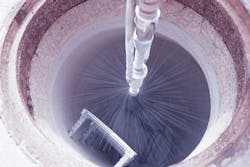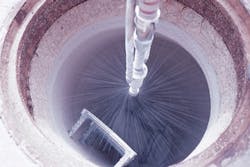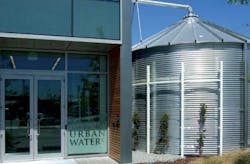Europe/Middle East
IBM partnership unveils plans for solar powered desalination plant in Middle East
A joint partnership proposal could see a solar powered desalination facility provide up to 30,000 cubic meters of water a day to 100,000 people in Saudi Arabia.
The proposed plant will be built in the city of Al Khafji and powered by a ultra-high concentrator photovoltaic (UHCPV) technology, jointly developed between Saudi Arabia's national research and development organisation, King Abdulaziz City for Science and Technology (KACST) and IBM.
The desalination process will use a nanomembrane, also jointly developed by the organisations, that will filter out salts while using "less energy than other forms of water purification".
One of the major aims of the project is to significantly reduce the cost of desalinating seawater - one of the ongoing criticisms of thermal and reverse osmosis treatment technologies.
The Al Khafi announcement followed IBM and KACST signing a collaborative research agreement in 2008 which means scientists from IBM and KACST will work side-by-side at IBM Research labs in New York and California as well as at the KACST/IBM Nanotechnology Centre of Excellence in Riyadh, Saudi Arabia.
Dr. Turki Al Saud, vice president for research institutes at KACST, said: "Currently, Saudi Arabia is the largest producer of desalinated water in the world, and we continue to invest in new ways of making access to fresh water more affordable."
Sharon Nunes, vice president at IBM Big Green Innovations, added: "Our collaborative research with KACST has led to innovative technologies in the areas of solar power and of water desalination.
"Using these new technologies, we will create energy-efficient systems we believe can be implemented across Saudi Arabia and around the world."
UK's import reliance leaves international water footprintThe UK's reliance on imported food and supplies is exacerbating water shortages in other countries, engineers have warned.
Two thirds of the UK's water footprint is imported in the form of food, energy and other goods that require water for production and transportation from countries that are under stress, according to a new report.
Entitled 'Engineering the future', the joint findings have been published from an alliance comprising the Institution of Civil Engineers (ICE), Royal Academy of Engineering (RAE) and the Chartered Institution of Water and Environmental Management.
The document urged the UK to take the lead by tackling its own water footprint, managing its own water resources sustainably but also by managing the virtual water embedded in its imports.
The country has a duty to provide leadership on the development and implementation of global responses because it uses so much water internationally, the alliance said.
Professor Peter Guthrie, chairman of the working group, said: "If the water crisis becomes critical it will pose a serious threat to the UK's future development because of the impact it would have on our access to vital resources. Food prices would sky-rocket and economic growth would suffer.
"To prevent this we must recognise how the UK's water footprint is impacting on global water scarcity. We should ask whether it is right to import green beans – or even roses - from a water-stressed region like Kenya, for example. The burgeoning demand from developed countries is putting severe pressure on areas that are already short of water. Our virtual water footprint is critical and we need to give it far more attention."
Several areas have been identified where further action is needed. These included:
• Water management solutions should be considered in the context of the entire water system, from "cloud to coast" as well as the implications immediately upstream and downstream. In this systems approach, all types of water must be considered together, and in this context, the flows and uses of water in a catchment area feeding the soil (green water), free water in rivers and reservoirs(blue water) and used or waste water (grey water) all need to be included.
• Developing new, sustainable sources of water through technology. The alliance said current methods, including desalination, water recycling, reuse and harvesting do not take the energy-food-water nexus into account.
Professor Guthrie added: "There is no single silver bullet for water security. Water management must be looked at in a holistic way, from 'cloud to coast' including all forms of water - in the soil as well as in rivers and reservoirs. Reducing demand will be important but so will developing engineering solutions to create new, sustainable sources of water and promote efficiency in current practices.
"This is a complex issue that transcends geographical and cultural boundaries and cuts across many other crucial sectors such as energy and food supply. To avoid the perfect storm requires a global response, with global policies and governance - backed up by forward-thinking action at a national level to meet individual countries' requirements."
The report can be downloaded at: http://www.ice.org.uk/downloads/gws.pdf
Kuwait takes delivery of 170,000 AMR metersMeter supplier Elster has secured a contract to deliver 170,000 water meters for use in residences, government buildings and other facilities throughout Kuwait.
Delivered to Kuwait's Ministry of Electricity and Water through its partner Al Khatla, Elster said the meters are design to cope with desert conditions across the Middle East and can withstand temperatures above 90 degrees, as well as violent sand and dust storms.
The Elster automatic meter reading (AMR) meters will be deployed inside and outside of house walls and in sidewalks with the aim to help Kuwait monitor consumption more effectively and strengthen the nation's water management programmes.
Currently, water conditioning in Kuwait is seen as expensive and complicated, and fresh water is not always delivered through pipes to homes.
Educating citizens of Kuwait on water conservation practises, along with accurately monitoring water consumption, will be essential to help maintain the nation's water infrastructure, the company said.
Elster said the smart meters are designed to function "regardless of sediments or containments in the water supply and can accurately measure varying levels of water quality".
In addition, the company added, the meters are designed to meet the demands of future Smart Grid and advanced metering infrastructure (AMI) projects.
New British standard to help engineers analyse buried pipelinesA new standard has been published to help engineers understand the concepts behind the structural design of buried pipelines.
The new standard BS 9295, "Guide to the structural design of buried pipelines" was developed through British Standards Institution Committee B/505/12/P1 since autumn 2007.
Sandra Rolfe-Dickinson, who was on the committee and is the technical director of pipeline engineering with environmental engineering consultants, MWH, said: "This new standard is sorely needed because structural design in the UK is currently undertaken in accordance with the National Annex to BS EN 1295-1. This is not the easiest or most intuitive document to follow if you are new to pipeline engineering or even if you are a more experienced engineer.
"It includes such "helpful" descriptions such as "wide" and "narrow" trench, but gives no guidance or definitions as to what would constitute a wide or narrow trench. Similarly, the terms "complete" and "incomplete" projection are mentioned, but no description is given of what these phenomena are or why they might matter. As the document progresses, new equations are introduced, which many engineers simply take on trust."
The BS 9295, will act as a guide to BS EN 1295-1, and sets out to explain and illuminate in simple terms the equations and concepts within the UK National Annex. It sets out to lead an engineer through the process of "rigid", "semi-rigid" and "flexible" pipeline design.
MWH said: "It includes clear diagrams to amplify concepts, and also reproduces the equations in the National Annex, making it a comprehensive and standalone structural design guide. It also includes two important annexes. One covers design loadings for buried pipelines including guidance on complex structural design situations such as pipelines on piles and multiple pipelines in trenches. The second holds simplified design tables, which give quick answers on pipe class and embedment for various pipe materials at a range of depths."
Rolfe-Dickinson went onto say: "This means that it is possible to design pipelines in accordance with the National Annex, meeting all the required criteria but without engineers fully understanding the principles behind the design. This is dangerous, as the implications of any changes made to the design, either in the office or on site, are not understood or appreciated, and this lack of understanding can lead to costly failures."
Severn Trent Services-Apliclor joins Spanish water associationSevern Trent Services-Apliclor has been selected as a member of the Board of Directors of the Asociación Española de Empresas de Tratamiento y Control de Aguas – Aqua España.
The company will join eight other representatives who have responsibility for the management of the association, which includes more than 130 organisations from the Spanish water sector.
Carlos Martín, commercial director of Severn Trent Services–Apliclor, said: "This is the most important and influential association in the water treatment sector in which the leading companies in Spain are represented."
The news followed Severn Trent Services-Apliclor installing Spain's first ever combined ultraviolet (UV) and chlorine dioxide disinfection treatment system at a wastewater treatment plant in Reus – a site operated by the municipal water company Aigues de Reus Empresa Municipal (see pages 22-23).
Martín is the company's representative in Aqua España and will be responsible, together with the other members of the board of directors, for promoting the common interests of the member companies.
A key initiative for the Aqua España board will be the implementation of the association's new strategic plan.
Irish government to invest billions of euros in water servicesIreland's environment minister, John Gormley, has published the Department's Water Services Investment Programme for the period 2010 – 2012 that outlines hundreds of contracts and conservation projects worth billions of Euros.
Comprising just over 130 contracts and water conservation projects in progress with a value of about €1 billion, the programme also outlined some 340 contracts to be progressed to construction over the period 2010 – 2012 with a value of €1.8 billion and some 190 schemes and water conservation projects on which planning work will continue.
The new programme is presented on a "River Basin District" basis and aims to prioritise projects that target environmental compliance issues, as outlined in the EU Water Directive.
The minister said: "The continuing high level of Exchequer allocation is a clear statement of the priority which the government is giving to preserving and protecting our water resources as a key element of our environment, to meet EU standards for drinking water and wastewater treatment and to provide critical infrastructure that will ensure ongoing support for economic development."
The Programme is the seventh in a series of Water Services Investment Programmes and provides for investment of some €320 million in network rehabilitation alone – a doubling of expenditure is this area over the past seven years, according to the Green Party.
The Minister also referred to the role of innovative measures in reducing demand for water. He announced that the use of water saving devices will be explored on a pilot basis during the Programme period including the use of such devices in toilet cisterns, to complement the dual flush requirement introduced under the Building Regulations.
Yemen private water operators boosted with World Bank fundHouseholds in Yemen not connected to a water network are set to benefit from a US$5 million grant that aims to expand access to water supply in the region.
The funded scheme will see private operators selected to help with building, rehabilitating water supply systems (wells, pumps and storage), installing domestic connections and delivering water supply for a period of three months.
Under the Global Partnership on Output-Based Aid (GPOBA) scheme, administered by the World Bank, around 210,000 people are expected to benefit from the grant.
Currently, only 56% of the urban population in Yemen are said to have access to piped water and many poor households living in peri-urban areas have to buy water from private tanker operators, who are reported to charge ten times more than the price of piped water from public suppliers.
Despite a reform of the water sector from the government that has seen the creation of local water and wastewater corporations, they are still unable to cope with the demand and many areas still lack access to improved water services.
David Craig, World Bank country director for Yemen, said: "The GPOBA project is a part of a larger sector-wide effort by the Government of Yemen and donors to increase access to water supply and sanitation services. By providing incentives for private operators to serve poor households, the output-based aid component will provide a complementary approach and help to close the affordability and service gap in peri-urban areas."
GPOBA is drawing on funds from the UK's Department for International Development (DFID) for this project. The scheme is also leveraging US$9.1 million from the World Bank's International Development Association (IDA) and US$2 million from the Government of Yemen.
Richard Pollard, World Bank and GPOBA task team leader for the project, added: "This project will help to strengthen the role of Yemen's private sector in the water sector and should also help define partnership arrangements between local private providers and local government water corporations. The beneficiary households will be able to make significant savings on monthly water bills and on health care costs linked to use of contaminated water."
Thames Water awards over £1 billion of contracts for AMP5Britain's largest utility Thames Water has awarded contracts for up to £1.2 billion of essential work to improve and maintain its ageing water pipes, sewers and other facilities over the next five-year period.
The joint ventures awarded in Thames Water's base load contracts included:
• Optimise (J Murphy & Sons/Clancy Docwra/Barhale/MWH) for north London and Thames Valley water pipes and sewers;
• MGJV (Morrison Utility Services/Galliford Try) for south London water pipes and sewers;
• GBM (Galliford Try/Biwater/Mott MacDonald) for north and south London water and sewage treatment works.
The work in these contracts includes continuing to replace London's worn-out Victorian water mains, upgrading sewers to protect customers' homes from sewer flooding, improving water and sewage treatment works and extending water and sewerage networks to accommodate future population growth.
Martin Baggs, Thames Water's chief executive, said: "In our continued drive to be more efficient for our 13 million customers we've completely changed the way we do our work. Instead of letting numerous small contracts to lots of providers, we're working with leading organisations to deliver the 'base load' of our investment programme for the next five years.
"This new approach has changed the way our contractors have bid for the work: they've formed joint ventures, each containing the required specialists. The way we've structured these programmes of work will also allow our contractors to plan further ahead and give them greater incentives to be efficient on cost and time."
Scottish water supplier secures £45 million contractScottish non-domestic water supplier, Business Stream, has been awarded a three-year, £45 million contract covering supply water services to both Scotland's university and college sectors, and central government organisations within Scotland.
The contract was awarded by Advanced Procurement for Universities and Colleges (APUC), who led the EU level competitive tender process.
As part of the contract, Business Stream will supply services for each organisation under the APUC umbrella, but via a group pricing structure, which will deliver immediate cost benefits to the contracting authorities concerned.
It is expected that the universities, colleges and central government organisations within Scotland will be able to reduce overall costs significantly as a result of the contract.
Business Stream relationship managers will visit each of the organisations covered under the deal and review water and wastewater practice, providing recommendations of how water efficiency can be improved.
Mark Powles, chief executive of Business Stream, said: "Water services shouldn't begin and end with turning on a tap; there are a host of ways in which organisations can manage their financial and environmental performance. We see our role as providing the information and tools required to implement good water management. Water savings generally equate to financial savings, and our customers benefit from the industry knowledge and technical expertise that we can offer them as part of the service."
Andy Anderson, senior procurement manager at APUC, added: "Water is often forgotten about as part of an organisation's cost base, but clearly colleges and universities are under pressure to be as efficient as possible, and we're confident that Business Stream will play an important role in aiding that process over the next three years."
More Water & WasteWater International Current Issue Articles
More Water & WasteWater International Archives Issue Articles





